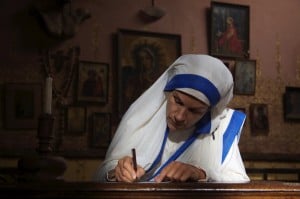How my ears have been burning! After yesterday’s column encouraging my readers to support the Catholic Campaign for Human Development with a gift in the second collection on Sunday, you rose up—on Facebook, on Google Plus, by email, and on my blog. You chastised me for trusting the bishops to fulfill their God-given responsibility to sanctify, to teach and to govern.
Most of the criticism emanates from faithful Catholics who draw their conclusions based on reports from two main sources: the Reform CCHD Now website, and Church Militant TV (Michael Voris).
True, there have been missteps on the part of CCHD staff in the past, resulting in scandal and misallocation of funds; but the USCCB has launched an energetic plan to correct those missteps. But please, let’s not quibble—let’s address your criticisms point by point.
WHAT YOU TOLD ME
I think we can fairly lump your complaints into several categories, including:
“Nothing has changed at the CCHD.”
Really? Maybe you missed the news reports regarding the Review and Renewal Process. Check out the resources available at the USCCB’s website—especially the “10 Commitments” to strengthen CCHD as a faithful and effective expression of Catholic teaching and the Gospel mandate to defend the lives and dignities of those who are poor in our nation.
“Maybe there’s a PR campaign at CCHD that recruits Catholic Bloggers to say nice things about them around this time of year?”
Well, no one recruited me! I approached the CCHD and the USCCB, asking for information for the article. I’ve seen nothing of the kind of politicking you suggest might motivate me.
“I think what I need to get behind the CCHD is a detailed explanation and an apology.”
They have apologized and have explained in detail, both regarding the problems of the past and the safeguards which will ensure that future grant recipients do not support programs which are in conflict with Church teaching.
Here’s an excerpt:
From its first days, there have been some criticisms about CCHD’s goals, guidelines and grantees. This criticism has become more visible with the wider use of internet communication and as polarization has increased in society and in the Church. CCHD takes any alleged violation of Catholic principles and CCHD policies very seriously. CCHD deeply regrets that in this past year five groups (out of 270) violated CCHD requirements and lost all CCHD funding because they acted in conflict with Catholic teaching. We apologize for the violations of CCHD policies by these groups and for the damage and confusion they have caused.
This Review and Renewal is putting in place stronger policies and clearer mechanisms to screen and monitor grants and groups to ensure that these past violations, though very limited, are not repeated. CCHD will do all it can to ensure that groups abide by these strengthened requirements and will act immediately and decisively if it is discovered that any group is violating these essential conditions for CCHD support.
There is more, much more, and I encourage you to see for yourself on the CCHD’s “Review and Renewal” webpage. Knowing though that many will not take the time to click a link, I repost below one section of their full report, that part dealing with “Catholic identity.”
“The CCHD continues to fund organizations which are pro-abortion, pro-homosexual, and otherwise in conflict with Church teaching.”
Well, now this is a sticky issue. There is clearly an effort to ensure that no organizations which conflict with Church teaching receive support through the CCHD. I did read, though, about one organization which reportedly lied in its grant application.
Will this happen again in the future? Maybe—I don’t know how it could be avoided; but any organization which breaks with Catholic teaching can be assured that there will be no renewal of their contract in the following year.
“Why would we expect anything less, when the woman running the CCHD show also works for President Obama?”
I paused for a minute to think about this—what woman could the commenter be talking about? The chair of the committee is Bishop Jaime Soto, a male; the director of the CCHD is Ralph McCloud, also a male.
I’m not sure, but I think the commenter was probably referring to Alexia K. Kelley, an Obama policy advisor with connections to abortion-supporting politicians and a controversial advocacy group. The only thing is, Kelley has just been named president and CEO of FADICA (Foundations and Donors Interested in Catholic Activities), and has no role at the CCHD.
One reader sent me a link to a scathing article in The Examiner. In it the author, William Luebner, warned:
Catholic Citizens of Illinois announced this week that it is…calling on all Chicago area Catholics to boycott the CCHD, and perhaps it is time the rest of us sat up and took notice.
But who, exactly, are the Catholic Citizens of Illinois? For one thing, they’re not from Illinois. They’re a group of conservative Catholics from around the country who rely, once again, on information published on the Reform CCHD Now website.
DOES IT REALLY MATTER? WHY NOT JUST DONATE TO OTHER GOOD CAUSES INSTEAD?
Well, for one thing, remember last year—how Catholics rebelled against the HHS Mandate, insisting that our mission requires that we help individuals and organizations outside our own faith? Put your money where your mouth is, folks! The need is great. And especially today, the CCHD is the best organization to demonstrate that the Catholic Church cares about the poor and the underserved.
CCHD has just pledged half a million dollars, for example, to help victims of Hurricane Sandy. If we default on that promise, if we ignore the Gospel mandate to help our neighbor, the secular world will not understand that “Catholics are angry about how funds were spent in the past, so won’t donate money in the present.”
No: The world will understand it as “Catholics don’t really care about the poor.” I, for one, really don’t want to convey that message.
* * * *
As I promised, here is a longer excerpt from the report, Section 1 on “Catholic Identity.”
1. CCHD’s Catholic Identity
CCHD will be more clear on the “Catholic” in the Catholic Campaign for Human Development. CCHD will review every aspect of its work, including funding criteria and guidelines, grant making process, and all applications and contracts to better reflect CCHD’s foundations and Catholic principles and to safeguard against any misuse of funds by groups. No CCHD funds will go to groups whose actions conflict with fundamental Catholic social and moral teaching.
A. CCHD will consistently cite the mission of Jesus “to bring good news to the poor, liberty to captives, new sight to the blind and set the downtrodden free” (Luke 4:18) as the foundation of all CCHD activities and communications.
B. CCHD will consistently make clear that it is an initiative of the Roman Catholic Church and a program of the United States Conference of Catholic Bishops (USCCB), not simply another funding source or foundation.
C. CCHD will consistently emphasize the scriptural, sacramental and spiritual motivations at the heart of the Church’s social mission, including how support of and participation in CCHD flow directly from the baptismal call of every Catholic and is expressed and strengthened by participation in the Eucharist.
D. CCHD will clearly reflect the teaching of Pope Benedict XVI in Deus Caritas Est and Caritas in Veritate about the centrality of the poor in the Church’s mission and the definition of charity, which “begins with justice” and calls for Catholics to pursue the “institutional path of charity” to advance the common good. CCHD will draw on Catholic social teaching to outline and shape its work and to provide a framework for action (e.g. The Church in the Modern World, Catechism of the Catholic Church, Compendium of the Social Doctrine of the Church, Centesimus Annos, Evangelium Vitae, Solicitudo Rei Socialis) as well as statements of the U.S. Bishops on poverty, economic justice and public life).
E. CCHD will emphasize the principles of Catholic social and moral teaching in all CCHD materials and communications (see the “CCHD Foundations” cited earlier). When CCHD speaks of “Catholic social and moral teaching,” it refers not to separate requirements, but to a consistent moral framework and common ethical principles, which begin with respect for the life and dignity of every person and include defense of the essential role of marriage and family life, the pursuit of social and economic justice and the search for the common good and genuine peace. CCHD will make the affirmative case that the same principles and values which call the Church to defend the unborn and vulnerable, marriage and family also call us to defend the life and dignity of the poor and those suffering injustice.
F. CCHD will be more clear and specific in all materials about the positions, activities and relationships not permitted by CCHD, because they conflict with fundamental Catholic teaching, (e.g. advocacy of abortion, same sex marriage, euthanasia, racism, as well as use of the death penalty, punitive measures toward immigrants).
1. Review and revise all CCHD forms, applications, grant agreements, website, etc. to clearly reflect CCHD mission and foundations, Catholic social and moral teaching and the directions and substance of this Review and Renewal.
2. Add introductory statement on CCHD mission foundations and identity on all forms, applications, materials.
3. Add to grant application initial questions on how proposal will advance CCHD mission (“good news to the poor…”), promote USCCB priorities (human life and dignity, marriage and family, cultural diversity), and encourage involvement of Catholic people, parishes and institutions, as well as other community structures, in overcoming poverty.
4. Revise CCHD Grant Agreement to more clearly state prohibited activities.
CCHD materials will be more explicit about the positions, activities and relationships not permitted by CCHD, because they conflict with fundamental Catholic teaching (see # F above).
5. CCHD will, with the assistance of USCCB General Counsel, add more specific language to the CCHD Grant Agreement that strengthens prohibitions on partisan politics and makes clear distinctions between politically partisan activities which are clearly prohibited and non-partisan voter registration, education and advocacy which are permitted.
6. CCHD will work with USCCB General Counsel to revise and refine the CCHD Grant Agreement for greater clarity, consistency and effectiveness. This will include a review of the use of “fiscal agents” and requirements related to them.
7. This revised grant agreement will be used for all pending and future funding allocations and grants.
G. CCHD will work to create a new position to focus on promoting, safeguarding and monitoring the Catholic identity of CCHD and compliance with CCHD requirements. This position will be funded by reallocating existing resources within the USCCB Department of Justice, Peace and Human Development.
H. In its materials and application, CCHD will further emphasize and encourage CCHD links to dioceses, parishes, religious communities, priests, deacons, and religious as well as Catholic Charities, schools, and other ministries. CCHD application and reviews will ask how funded activities reach out and involve the Catholic community. Priority will be given to proposals which lead to greater diocesan and parish engagement with activities and participation in organizations which clearly carry out CCHD‟s mission and foundations.
I. CCHD will work with bishops, CCHD Diocesan Directors, committees, staff and CCHD allies to develop new traditional media to share Catholic principles and CCHD guidelines for diocesan staff, funded groups, and others to promote better understanding of CCHD mission, foundations, policies and restrictions.















